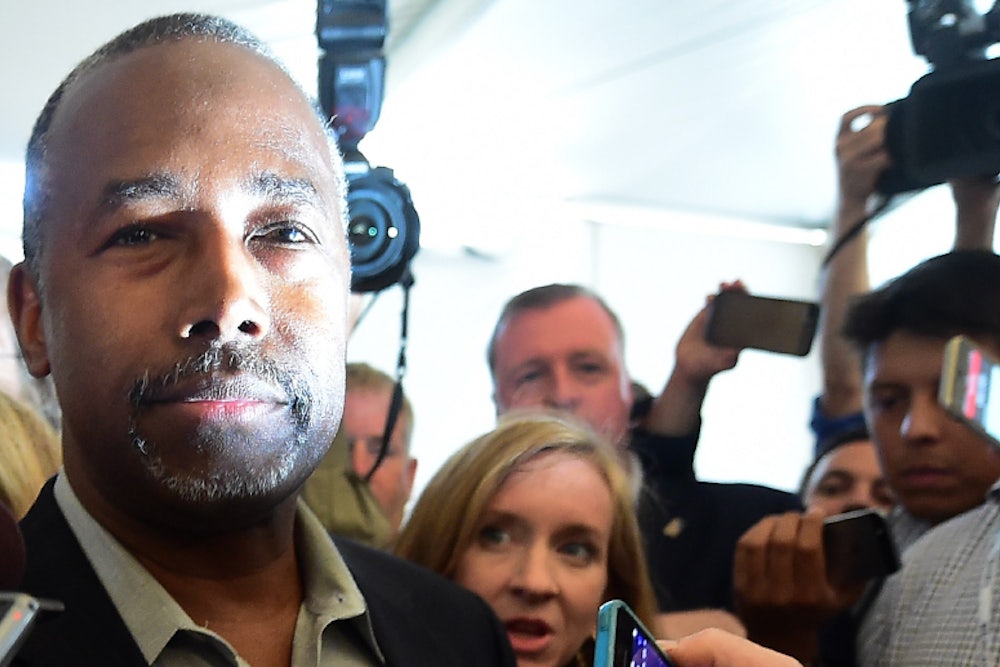Last night in Kentucky, Matt Bevin, a Tea Party-aligned Republican who unsuccessfully attempted to unseat Senate Majority Leader Mitch McConnell last year, was elected the state’s second GOP governor since the end of the Civil Rights Movement.
Conservatives are understandably elated. Bevin ran rightward even by Kentucky's standards. His political career has been forged in the conservative backlash to President Obama, and Bevin supports both federalizing Kentucky’s extremely successful state-based health care exchange, and rescinding the state’s Medicaid expansion, which has brought coverage to over 400,000 poor Kentuckians since 2013. As a candidate for Senate, where his vote would’ve counted, he supported the outright repeal of the Affordable Care Act.
But amid the euphoria over a victorious politician who wants to roll back the tide of social justice, conservatives are also celebrating their own perceived sense of racial enlightenment. Because though Bevin and most of his supporters are white, his running mate, Lieutenant Governor-elect Jenean Hampton, is black.
In Kentucky we see the general scope of Republican minority outreach in microcosm—the touting of a popular black figurehead juxtaposed against an unrelenting pursuit of policies that harm, and are unpopular with, black voters nationally.
The most apt symbol of this conception of racial tolerance is Ben Carson, who climbed out of poverty to become the most renowned black neurosurgeon in the world. He also sits well to the right of the median Republican primary candidate, which helps explain his surge in the polls. Last week, National Review’s Jonah Golberg wrote a column arguing that Carson is “even more authentically African American than Barack Obama, given that Obama’s mother was white and he was raised in part by his white grandparents.”
Goldberg interprets the fact that a person of such authentic blackness is a popular, conservative member of the Republican Party as a matter of deep significance, when in fact it confirms that the right's commitment to racial justice has a deeply superficial quality. After a predictable backlash to the blackness scale he contrived, Goldberg revised and extended.
“The Democrats, MSNBC, Salon, et al,” he wrote, “are so invested in their narrative that the GOP is a racist cult that they have trouble dealing with the fact that Ben Carson—a black guy—is arguably the front-runner and certainly the most popular figure in the Republican field (and drawing most of his support from precisely the voters the MSNBC crowd is most convinced are the recrudescent racist heart of the conservative movement). Rather than celebrate this huge step forward in racial progress, or at least think about what it really means, they instead ignore it, dismiss it, or attack my 'racism' for pointing it out. Well, to Hell with that game.”
This would fatally undermine the liberal critique of racial politics on the right, if liberals argued that Republicans belonged to a segregated party that espoused hatred for minorities no matter their politics. Instead, Goldberg is celebrating tokenism on the scale of a national, ideological movement.
That Carson is black and popular among Republican primary voters is incontrovertible. It’s also largely beside the point. The question of why Carson is popular on the right is complicated, and surely in part related to his aforementioned conservative politics, his religious devotion, and his hypnotically avuncular demeanor. But it is just as surely related to the fact that Carson absolves conservatives of their coarse and patronizing view of black voters and political leaders. Carson attributes his unpopularity with liberals to the notion that he had the temerity to “come off the plantation.”
Needless to say, the fact that Republican voters like a guy who tells them that other black people—the ones who support Democrats—are like plantation slaves doesn’t harm the liberal critique of conservative racial politics at all. Nor does it cancel out or refute the existence of racism.
The Kentucky poor are now in limbo, though their position is tellingly strengthened by the fact that Kentucky is whiter than the median state. Beneficiaries of the Medicaid expansion there are whiter and more geographically dispersed than in other states. The prologue to their story may come from Arkansas, which declined to rescind its version of the Medicaid expansion, even after voters there replaced a retiring Democratic governor with a Republican.
So there is hope. But there's also peril. What distinguishes Kentucky is that its Medicaid expansion was undertaken unilaterally by outgoing Governor Steve Beshear. Though he softened his position during the general election, Bevin could rescind it on his own, without going to the legislature.
If he declines to do so, conservatives will consider it a great setback in their ongoing campaign against the national wave of Medicaid expansion, a campaign that has done disproportionate harm to low-income black people all over the country. And that says far more about the racial politics of their movement than the fact that Kentucky’s incoming lieutenant governor is black herself.
